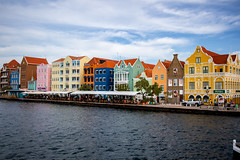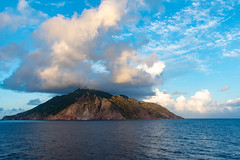Antilhas Holandesas : Photos
Descubram cada dias das Fotografias dos diferentes países da África e as Antilhas
Todas as imagens provêm do serviço de divisão de fotografia flickr
Utilizem a ementa de esquerda para escolher um país.
Setting moon
Woke up one morning to a golden moon setting within a purple sky. Just to be sure the colors were right, I set a custom white balance using a nearby house painted in white. A reminder of the simplicity of life before the crisis.
Slave huts on Bonaire
Buy this photo on Getty Images : Getty Images
Bonaire Slave Huts
Before it was a scuba destination, Bonaire's main industry was the production of sea salt. In the days of slavery, men and women were forced to work as saltrakers in the salt evaporation pans of Bonaire's south shore. Slaves were housed in these small huts, now maintained by the local parks department.
Submitted 07/02/2015
Accepted 05/03/2015
Published:
- AMADEUS SAS (France) 04-Sep-2018
- P&O Cruises Carnival UK (United Kingdom (Great Britain)) 12-Sep-2019
- Mediahuis nv (Belgium) 25-May-2020
Tucked inside
A squat shrimp (Thor amboinensis) nestled amongst the tentacles of a giant anemone (Condylactis gigantea).
To give a sense of size, that shrimp is about 1cm long - the tentacles of the anemone are comparable in thickness to your pinky finger.
The challenge with this image is that nothing stays still underwater. And because of the long recharge time on the strobes, you can't just fire off a burst of shots (the "spray and pray" approach). Instead, timing and some luck is needed. With this image the tentacles parted nicely, the autofocus locked onto the shrimp, and the strobes were in a nice position to light the scene.
Antique Gun Century Old Edited 2020
Feel free to use this image but please give credit with a link to www.reloaderaddict.com (NOT Flickr)
Sea Curacao Boka Pistol Edited 2020
Feel free to use this image but please give credit with a link to www.reloaderaddict.com (NOT Flickr)
Curacao
RJR Photography, WA posted a photo:
Philipsburg, Saint Maarten
Celeumo posted a photo:
Philipsburg, Saint Maarten
Celeumo posted a photo:
Philipsburg, Saint Maarten
Celeumo posted a photo:
Philipsburg, Saint Maarten
Celeumo posted a photo:
Philipsburg, Saint Maarten
Celeumo posted a photo:
Passing the island of Saba, Netherlands Antilles
graham.trimming posted a photo:
Passing the island of Saba, Netherlands Antilles
graham.trimming posted a photo:
Passing the island of Saba, Netherlands Antilles
graham.trimming posted a photo:
No worries
Instead of "sticking our heads in the sand", we like to "submerge our souls in salt water". Given the craziness and scariness around us now, we can all use a bit of escapism. Wishing everyone health and well-being.
The green turtle in this image just took some breadths at the surface and is returning to the bottom to feed on some seagrass.
Cruising
A caribbean reef shark (Carcharhinus perezi) cruising over the reef. We almost never see sharks on Bonaire (the topography of the island isn't suitable for them), but on this dive we were graced with their close-up visits throughout the dive and up to four at once. To put that in perspective, in our last 500 dives, we have seen nurse sharks on 2-3 of them and a reef shark briefly in the distance on one of them.
We did NOT chum for them. They showed up and were curious about us, but we never felt threatened. Our other sightings on the dive included crevale jacks (rare), queen triggerfish (rare), ocean triggerfish (rare), hogfish (rare), green moray, several large groupers (uncommon, unfortunately), green turtle and a large "fish ball" (uncommon) of mostly schoolmasters and mahogany snappers. All on one dive. One for the record books.
Table for three
Green turtles (Chelonia mydas) tend to be solitary. In this case they seemed to tolerate each other, maybe because the sea grass was plentiful or too tasty. They also were not concerned with my presence.
Sea grass is their main food source, and is what makes their fat green, which gives them their name (rather than the color of their shell). They are listed as "endangered" by IUCN. Threats include the harvesting of turtle eggs (which is still legal in many countries) and bycatch from fishing, among others.
I was shooting into the sun and they were kicking up plenty of sand, hence the "haze". But maybe it adds a bit to the photo.
In social interactions they say that "three is a crowd", but compositionally speaking, three feels just right.
Blue-tailed emerald
A male blue-tailed emerald (Chlorostilbon mellisugus) feeding on the flower of an aloe.
The males let out a distinctive chirp each time they move positions, which really helps to locate them. The females don't seem to chirp, so they are harder to spot and therefore to photograph.
Longsnout seahorse (Hippocampus reidi)
Seahorses are endearing creatures. Of course, they have no connection to land horses (they are fish), but who can't fall in love with its horse-like face, its gentle demeanor, and the fact that male carries the eggs.
I don't have a snoot to focus my strobe lights, but the terrain was perfect to yield some light on the seahorse and nothing else.
Making sand!
Or maybe the caption could be ...
"Mister Ed becomes a fish"
This is a stoplight parrotfish (spansoma viride) chopping down on a dead coral face to scrape off some algae. Doing so helps to keep the reef clean. And the byproduct is the fine sand seen on the beaches.
Parrotfishes are like squirrels - you think they are amazing when you first see one, and then you find out that they are everywhere. That said, they do happen to be beautiful fish, just hard to photograph - it is easy to approach to about 1-2 meters and then they turn to swim away. I snuck up on this one around the coral head and caught it mid bite. While diving you can hear their grinding on the reef.
Imagens automaticamente encarregadas desde flickr com para tags : (NetherlandsAntilles)









